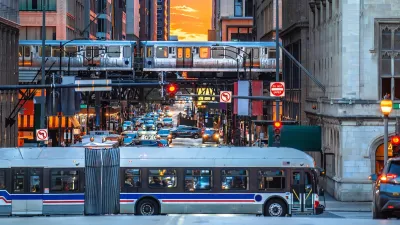A study just published in Economic Development Quarterly documents the geographical destruction on local businesses wrought by a new Walmart store, and raises questions about its long-term impact on sales tax revenues, reports Nate Berg.
The study, authored by a team led by University of Illinois Chicago economics professor Joe Persky, looked at the effect of the opening of a Walmart store on existing businesses and found a direct geographic correlation with rates of closure.
"No matter which direction you go from Walmart, there's a very high rate
of business closures in the immediate vicinity, and the further away
you get there's less and less," says Persky. According to Berg, "Persky and his colleagues found that for every mile closer to the
Walmart, 6 percent more stores closed. Close in around the store's
location, between 35 and 60 percent of stores closed."
"The research also shows that during the study period, from 2006 to 2008,
overall sales tax revenues went down in the two ZIP codes closest to or
encompassing the Walmart," notes Berg.
Granted the study only focused on the effect of one Walmart store, located in the Austin neighborhood of Chicago's West side. It also failed to "include any data on stores that opened during the 2006 to 2008 period, just those that closed."
"Walmart disputes these findings and argues that its stores are magnets for both growth and economic development," says Berg.
FULL STORY: Radiating Death: How Walmart Displaces Nearby Small Businesses

Alabama: Trump Terminates Settlements for Black Communities Harmed By Raw Sewage
Trump deemed the landmark civil rights agreement “illegal DEI and environmental justice policy.”

Study: Maui’s Plan to Convert Vacation Rentals to Long-Term Housing Could Cause Nearly $1 Billion Economic Loss
The plan would reduce visitor accommodation by 25% resulting in 1,900 jobs lost.

Planetizen Federal Action Tracker
A weekly monitor of how Trump’s orders and actions are impacting planners and planning in America.

Wind Energy on the Rise Despite Federal Policy Reversal
The Trump administration is revoking federal support for renewable energy, but demand for new projects continues unabated.

Passengers Flock to Caltrain After Electrification
The new electric trains are running faster and more reliably, leading to strong ridership growth on the Bay Area rail system.

Texas Churches Rally Behind ‘Yes in God’s Back Yard’ Legislation
Religious leaders want the state to reduce zoning regulations to streamline leasing church-owned land to housing developers.
Urban Design for Planners 1: Software Tools
This six-course series explores essential urban design concepts using open source software and equips planners with the tools they need to participate fully in the urban design process.
Planning for Universal Design
Learn the tools for implementing Universal Design in planning regulations.
Caltrans
Smith Gee Studio
Institute for Housing and Urban Development Studies (IHS)
City of Grandview
Harvard GSD Executive Education
Toledo-Lucas County Plan Commissions
Salt Lake City
NYU Wagner Graduate School of Public Service





























